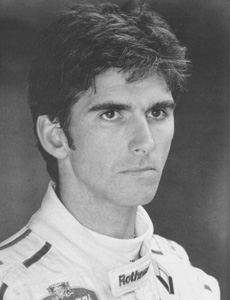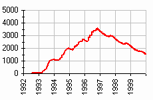Гонщики, H | |
Hill, Damon Курсивом отмечены гонщики, |
| Дэймон ХиллHill, Damon |
 (c) 'Who is Who' by Steve Small, 2000 Родился: 17.09.1960 Хэмпстед, Лондон Сезонов в Ф1: Лет в Ф1: 8 Гран При: Старты: 115* *не стартовал: 7 Победы: - подряд: 4 Подиумы: - подряд: 6 Поул-позиции: - подряд: 4 Первый ряд: - подряд: 17 Быстрые круги: - подряд: 2 Лучший финиш: Лучший старт: 1 Дубли: Хет-трики: 5 Лидирование старт/финиш: Большие шлемы: |
Год | Команда | Шасси |
Damon has earned his success the hard way for, just like his father Graham, he has had to work his way up to the top with plenty of determination but little in the way of the financial help which is such a crucial element in modern-day racing. Sadly, of course, his illustrious father has not been able to offer him the benefit of his experience, but it is to Damon's great credit that, once he had decided on a career in motor sport, he progressed entirely on his own merits. There can have been no one in the F1 paddock who begrudged him his success when, in 1996, he emulated his father in winning the World Championship.
In fact, at first he was more interested in bikes than cars and made his competition debut on two wheels, which led him into a job as a despatch rider while he worked on his fledgling career. After a brief taste of Formula Ford at the end of 1983, Hill found himself drawn into the world of motor racing and, with the help of Brands Hatch supremo John Webb in the form of free tuition and a little promotion, he went racing seriously in 1985, enjoying a very competitive year of Formula Ford. His elevation to F3 for 1986 with Murray Taylor Racing may have been a little premature, but he finished ninth in the championship and then proved himself in the formula during a two-year spell at Intersport, winning splendidly at Zandvoort and Spa in 1987 and taking two more victories in 1988, including the prestigious Grand Prix support race at Silverstone.
Damon then moved up to F3000 for 1989 and gave a good account of himself in the troubled Footwork before switching to Middlebridge the following year, when luck was not on his side in terms of results but more importantly he established himself as a genuine racer, capable of beating anyone in the field. A third year of F3000 in 1991 should have brought some real success at last but his Lola was no match for the Reynards and his first win remained elusive. There was, however, the consolation of a Williams testing contract, and the following year his work for the team helped ensure that the damage to his reputation arising from a calamitous half-season with Brabham, when he managed to qualify only twice, was merely superficial. So impressed was Patrick Head with his contribution that he was to be Damon's strongest advocate when the chance of a Grand Prix drive with the team in 1993 arose.
The way he handled his first year in a top team was exemplary in every respect. Unfazed by a couple of early gaffes at Kyalami and Imola, Hill pushed team leader Alain Prost harder and harder as the season wore on, while remaining acutely aware of the delicate political situation within the team. The fact that he won three Grands Prix was a bonus, his drive at Spa when he withstood severe pressure from Schumacher demonstrating that he had the stuff of which real winners are made. In 1994 he faced his biggest test with the arrival of Ayrton Senna. Tragically, within three races, Damon was facing the task of rebuilding shattered morale at Williams in the way his father had done at Lotus in 1968. In Damon's case, he still had comparatively little experience and rose to the challenge magnificently. Nigel Mansell's return in France prompted Hill to raise his game and push back the veteran's claim to a full-time seat alongside him, then at Silverstone came a win in the British Grand Prix, a triumph made so special because it is a race Graham never won.
In a season of drama and controversy, Damon took advantage of Schumacher's disqualifications and enforced absence through suspension to close the gap enough to enable him to still win the championship. A superb drive in the wet at Suzuka was worthy of the German at his best, and it was all to play for in Adelaide. The manner in which the title was decided when Schumacher bounced back off the wall into Hill's path was unsatisfactory to say the least, and his critics thought Hill should have avoided the situation. In any event, the title was lost, but Damon's exemplary reaction in the aftermath spoke volumes for him as a person.
The slate was wiped clean for 1995 and with the latest Williams FW17 in formidable form Hill set out on the championship trail with renewed vigour. A potential victory in Brazil was lost with suspension failure, but two consecutive wins seemed to indicate that the Englishman was on course for the title. Unfortunately Schumacher and Benetton had other ideas and Damon soon found himself on the ropes as the German ruthlessly exploited every weakness in the Williams armour. It was not until Hungary that the tide was stemmed, but, just as in boxing, winning occasional rounds does not win the fight and, despite his dominant performance in the final race at Adelaide, this World Championship bout went to Schumacher on points by a comfortable margin.
When you have a multi-million-dollar contract and you drive for one of the world's leading Grand Prix teams, then expectations are naturally high, as Hill had found during the two seasons he had been leading the Williams challenge. For such a polite and genuinely decent individual it must have been hurtful to have been thrown more brickbats than bouquets by a despicable element of the press, who lay waiting to pounce on any error with glee. It goes with the territory, they would say, but the treatment meted out to him at times during this period was disgraceful.
Undoubtedly the 1996 season was Damon's best-ever chance of taking the championship and with the advantage of his major rivals bedding down in new teams, and a rookie partner in Jacques Villeneuve, he could have no excuses if he failed. In the event, of course, mission was accomplished, with the popular Englishman winning eight of the sixteen races to pip his team-mate to the crown. The only shadow across his season was the decision by Frank Williams to dispense with his services in favour of Heinz-Harald Frentzen, leaving Damon with no chance to secure a top ride in 1997.
So, after protracted negotiations with Jordan, Hill threw in his lot with Tom Walkinshaw at Arrows amid much brave talk of winning races. In the event he very nearly did, a superb drive in Hungary bringing second place when the car hit trouble on the penultimate lap. Otherwise it was a different story as the unfancied team struggled to make an impact, with Damon and his ambitious employer failing to see eye to eye. After negotiations with both McLaren and Prost, Hill joined up with Eddie Jordan for '98, tempted by a healthy retainer and the prospect of Mugen Honda-powered cars. At first it seemed like a huge mistake for all concerned, Hill struggling to make any impact in a poorly developed car, and it wasn't until the air was cleared in mid-season that things moved in the right direction. Fourth places at Hockenheim and the Hungaroring preceded the now famous wet-race win at Spa with which Damon was finally able to realise Eddie Jordan's dreams of victory.
Grand Prix racing has little room for sentiment, however, as Hill was soon to find in 1999 when he was comprehensively overshadowed by his new team-mate Heinz-Harald Frentzen. So unhappy was Damon with his performances in the new generation of Formula 1 car that he contemplated immediate retirement after a miserable showing in the French Grand Prix. As it transpired, he continued in tentative fashion until the season's end. Physically, Damon had emerged unscathed but, sadly, his reputation had received a severe bruising.
(c) 'Who is Who' by Steve Small, 2000
| © WildSoft, 1995-2020 |


